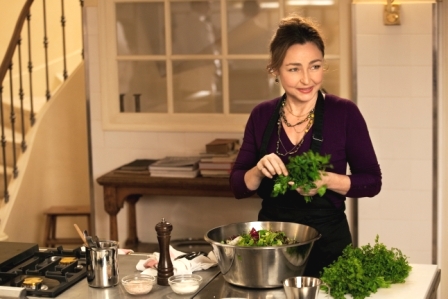When Hortense Laborie (Catherine Frot) is whisked away from her country farm to the Palais de l’Élysée and offered the job of personal chef to then-President Francois Mitterrand (Jean d’Ormesson), she’s initially confused but is quickly assured that the president longs for the plain, wholesome peasant fare he fondly recalls from childhood. In a private conversation later on, the elderly president entreats her to give him the “best of France,” and—despite obstacles—Hortense throws herself into doing just that, in this film based on the experiences of Mitterrand’s real-life chef, Danièle Mazet-Delpeuch.
Down-to-earth and unpretentious Hortense is presented as an outsider. The lavish opulence of the Palais, with all its points of etiquette, sharply contrasts with her rural origins, and she’s obviously unwelcome in the testosterone-fueled main kitchen, where brusque and burly chef Pascal Lepiq (Brice Fournier) doesn’t deign to speak to her and the underlings steal baleful glances at her. Rather than attempt to win over the main kitchen, Hortense dismisses their narrow-minded macho attitudes, and instead embraces her own domain, the smaller and far more tranquil private kitchen. With the help of eager young sous-chef Nicholas (Arthur Dupont), Hortense sets about successfully preparing delectable dishes from day one.
Hortense never sheds her more down-home ways—on her first day, she returns to her apartment for a piece of muslin to use as a strainer, and her highest praise for Nicholas’s cornbread is that it tastes exactly like one her grandmother used to make—and she serenely flouts many regulations in order to satisfy Mitterrand’s tastes. For example, in spite of instructions to obtain ingredients through the pantry in the main kitchen, she often leaves the confines of the Palais to find the perfect truffle or the right piece of fish. Despite this, Hortense is depicted less as a rebel looking to turn the orderly world of the Palais upside down. Rather, she’s irritated by what she sees as pointless rules preventing her from truly fulfilling the duties of her job.
Based on scenes that jump ahead several years and across the world to the rugged Antarctic tundra, it’s clear that things haven’t quite worked out. After lasting less than two years at the Palais, Hortense takes a job as a cook for an all-male team of researchers, working in another masculine environment—this time, one in which she’s heartily appreciated. An exasperatingly inquisitive Australian journalist, here to document the team, learns about Hortense’s past, and, convinced that this is the story she’s been waiting for, begins hounding her for details.
While there are hints of scandal (the older president’s fondness for both Hortense and her cooking have resulted in rumors of an affair), this is a story refreshingly free of manufactured drama. Just as Hortense resists the journalist’s attempts to create a seamy exposé out of her life, director Christian Vincent opts not to frame Haute Cuisine as the tale of a quirky outsider beaten down by the establishment or as a scrappy underdog story. Instead, it’s simply one woman’s experience. The moments of tension Hortense encounters (the main kitchen’s refusal to let her store a tray of oysters in one of their refrigerators or the lectures from her superiors on overspending) are presented as everyday nuisances to be endured, though admittedly disheartening, and while Frot allows Hortense’s often justifiable frustration to break her composure at times, she plays the chef matter-of-factly, with steely eyed determination and obvious passion.
Although the shots of the meals are appropriately sumptuous, in terms of plot and character development, this is a decidedly sparse film—much like the cuisine that Hortense and Mitterrand exalt. Little of Hortense’s inner life is revealed, and even the occasional references to her childhood or personal life are framed in terms of food. Those hoping for more intrigue or scandalous details may come away disappointed. However, her moments of triumph are both realistic and genuine, as are the pleasures that this well-crafted and unfussy film provides.

















Leave A Comment